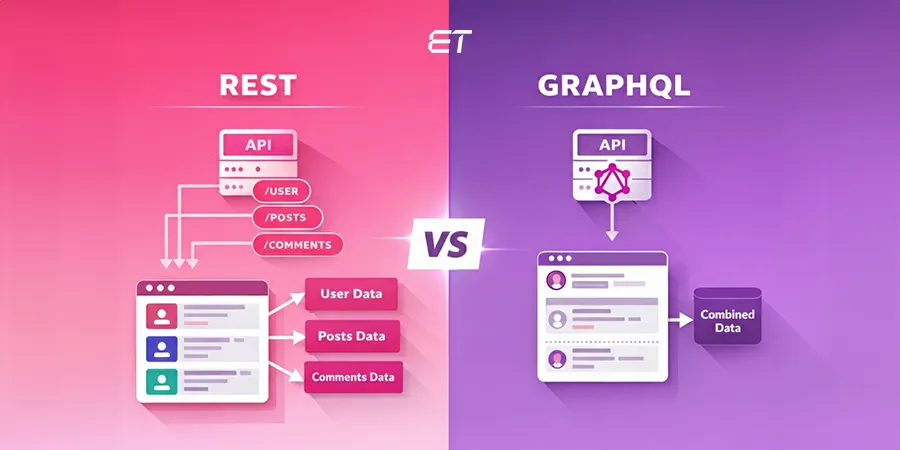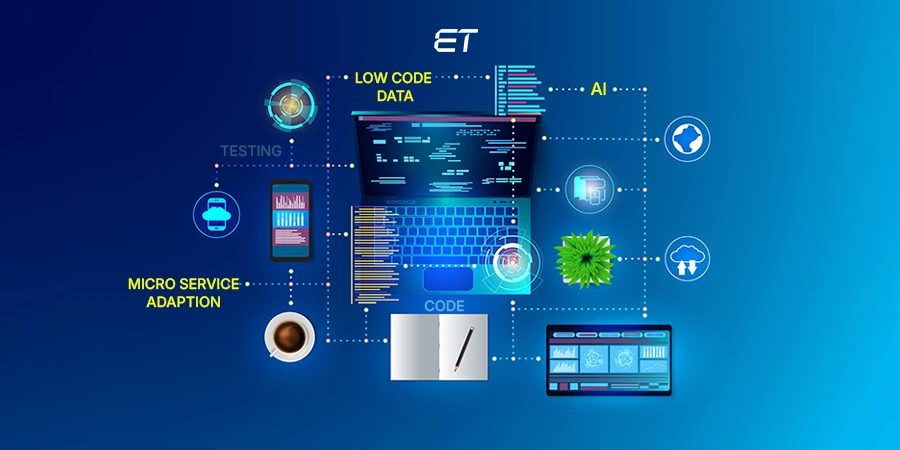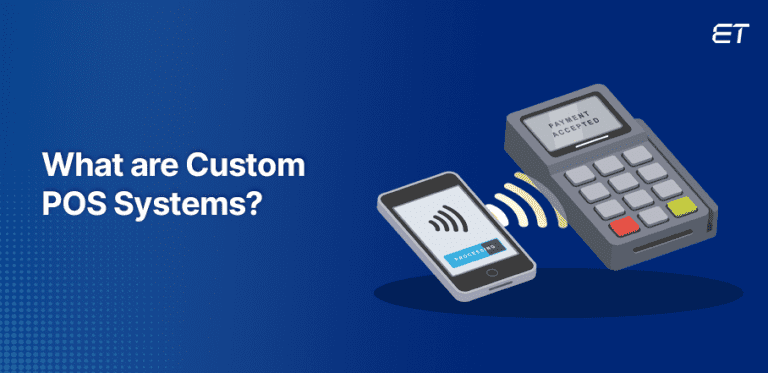
Custom POS Software Development Guide for Businesses
Every day you begin analyzing your business finances, it’s the same old story – Manual data entries, cyber security concerns, and lack of customer management features. During times like these, you wish someone would build a custom POS system for your business.
And why not?
The POS (point-of-sale) terminal market is booming and has high potential, especially in the US. In fact, experts predict that the valuation of this sector may reach USD 41 billion by 2029. A huge number to get your attention, right?
In simple words, with a robust POS system, you can unearth an array of advantages to unleash efficiency, integrate loyalty programs, and build a happy customer base.
Long story short, you need to choose robust custom POS software development. This blog will explain all the crucial parameters that can prove useful when you embark on this vital decision.
What is Custom POS Software Development?
Let’s break it down.
Unlike off-the-shelf systems that offer fixed features and limited flexibility, custom development gives you full control over how the software works, what it looks like, and how it integrates with your existing tools.
Here’s what custom POS development typically includes:
- Requirement Analysis: Understanding your business model, workflows, customer journey, and operational challenges
- Design and Architecture: Planning the system’s user interface, functionality, and backend structure to align with your processes
- Development and Integration: Coding the solution, integrating it with your existing hardware and software (like accounting, inventory, CRM tools), and ensuring smooth operation
- Testing and Deployment: Verifying that the system works flawlessly across environments
- Ongoing Support and Scaling: Adding features, troubleshooting issues, and making improvements as your business evolves
In essence, custom POS software development is about designing a system that amplifies your business.
So, whether you run a boutique retail store or a chain of restaurants, custom POS development can help you build a robust payments solution.
Benefits of Custom POS System
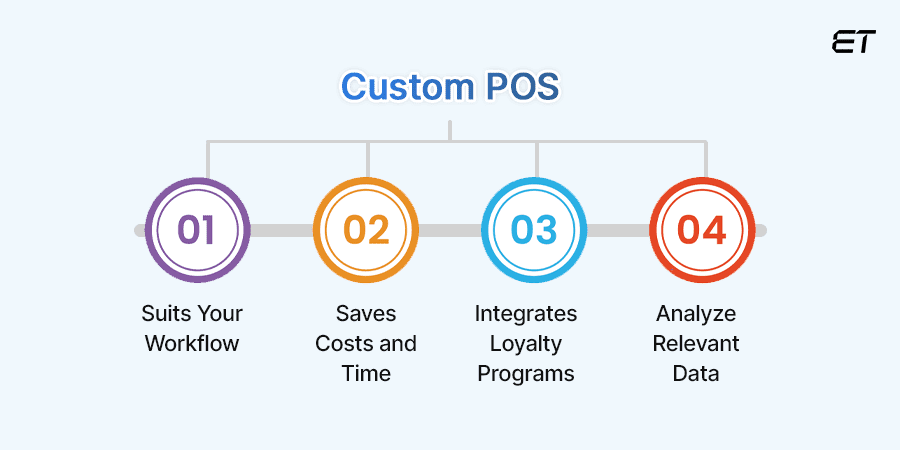
If you are a CXO, it’s essential to make decisions to maintain happy customers, right?
Well, investing in a custom POS system is one of the most valuable choices. Let us explain how:
- Off-the-shelf POS systems have a one-size-fits-all approach. On the other hand, a custom system can suit your unique workflows, eliminating bottlenecks and streamlining operations for significant time and cost savings
- A custom POS system can integrate loyalty programs, targeted promotions, or self-service options. So, you can keep customers happy and satisfied
- Such a customized system can capture and analyze data specific to your operations, providing actionable insights to optimize inventory, marketing, and staffing
- Custom POS systems can have robust security features designed for your specific needs
Overall, you need a custom POS to give you a significant edge over the ever-growing competition.

Want a personalized discussion on developing your own custom POS? Schedule a call now!
Types of POS Systems
Not all POS systems are created equal. Depending on your business model, budget, and tech setup, you can choose a system type that matches your operational needs.
Let’s break down the most common types of POS systems in the market:
1. On-Premise POS Systems
These are locally installed systems that run on your own servers or computers.
Best suited for: Businesses that need full control over data, like enterprise retailers or large restaurants with dedicated IT support.
✅ Pros
- ✔️ Full ownership and control
- ✔️ Faster local performance (no internet dependency)
- ✔️ Customizable (if built in-house)
❌ Cons
- ❌ Requires in-house IT maintenance
- ❌ Higher upfront infrastructure cost
- ❌ Limited remote accessibility
2. Cloud-Based POS Systems
Also known as web-based or SaaS POS systems, these operate over the internet and store data in the cloud.
Best suited for: Small to mid-sized businesses, pop-up stores, or businesses with multiple locations.
✅ Pros
- ✔️ Access from anywhere with an internet connection
- ✔️ Lower upfront cost
- ✔️ Automatic updates and backups
- ✔️ Easy integration with other SaaS tools (eCommerce, accounting, etc.)
❌ Cons
- ❌ Dependent on stable internet
- ❌ Ongoing subscription fees
- ❌ Data is stored on third-party servers (choose your provider carefully)
3. Mobile POS Systems (mPOS)
These run on smartphones or tablets using dedicated apps, turning your device into a fully functional POS.
Best suited for: Small vendors, food trucks, pop-up events, or any business that needs to accept payments on the go.
✅ Pros
- ✔️ Extremely portable
- ✔️ Affordable and quick to deploy
- ✔️ User-friendly for non-technical staff
❌ Cons
- ❌ Limited features compared to full-scale systems
- ❌ Might not handle complex inventory or multi-store setups well
4. Self-Service Kiosk POS Systems
These are interactive terminals that let customers place orders and complete transactions independently.
Best suited for: Fast food chains, cinemas, retail outlets, or any business that values customer speed and autonomy.
✅ Pros
- ✔️ Reduces wait times and labor costs
- ✔️ Improves order accuracy
- ✔️ Enhances customer experience
❌ Cons
- ❌ Higher hardware investment
- ❌ May require ongoing UX optimization
- ❌ Not ideal for all customer demographics
5. Multichannel POS Systems
These systems sync across physical stores, online platforms, and even social commerce — giving you a unified sales ecosystem.
Best suited for: Retailers who sell both online and offline, or brands managing multiple sales channels.
✅ Pros
- ✔️ Real-time data synchronization
- ✔️ Unified customer and inventory management
- ✔️ Better insights into overall business performance
❌ Cons
- ❌ Requires more robust setup and backend integration
- ❌ Can be costlier than single-channel solutions
All in all, choosing the right POS system type is about aligning with your business model and growth plans.
Popular Industries Benefiting From a Custom POS System
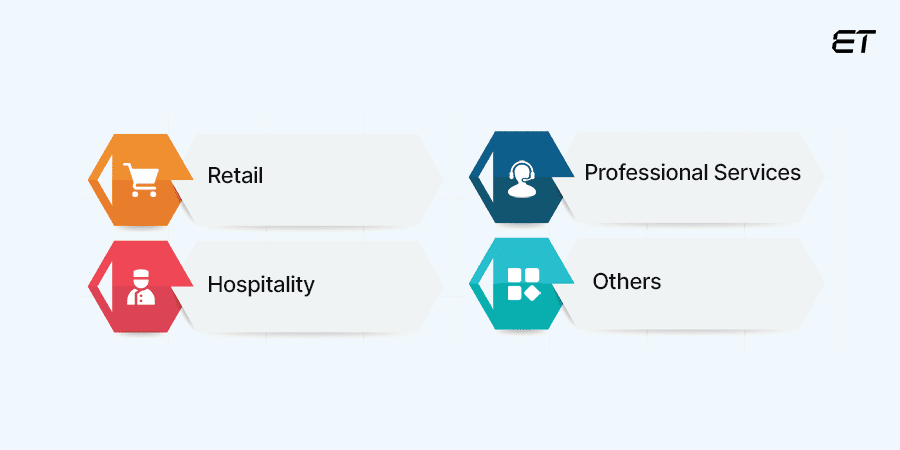
A custom POS system can be a transformative investment. If your business falls into any of the sectors mentioned below, it’s a good time to consider developing one.
| Name of the Industry | Examples |
| Retail | Specialty stores, subscription services, quick-serve restaurants |
| Professional Services | Law firms, consulting agencies, medical practices |
| Hospitality | Dining, event venues, hotels |
| Miscellaneous | Fitness centers, spas, salons, NGOs |
Remember, a custom POS system is an investment. By carefully considering your unique needs and workflows, you can unlock a powerful tool that drives efficiency, enhances the customer experience, and gives you an edge in your domain.
How Does a Custom POS System Work?
The word ‘custom’ conveys a lot about these POS systems.
They are tailor-made platforms that suit your unique business requirements. But how do they achieve this aspect? Read below to understand their functionality.
It Builds on its Core Functions
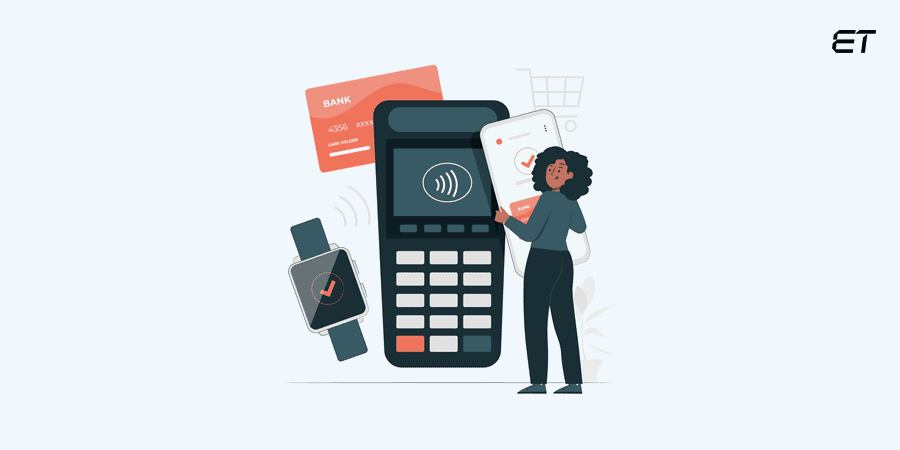
A custom POS system focuses on sales processing. Here are the activities that fall under this segment:
- Addition of financial items
- Calculation of taxes and discounts
- Finalization of payments
However, custom POS goes beyond basic stock tracking. It handles complex inventory structures, real-time multi-location updates, low-stock alerts, and reorder suggestions tailored to your buying patterns.
In addition, these systems enable you to store customer information, purchase history, and preferences. This way, you can plan targeted promotions, integrate loyalty programs, and offer a personalized shopping experience.
It Fits Your Business Requirements

A custom POS system can perform the following activities or tasks:
- Industry-Specific Features: For example, a restaurant POS can include table management, kitchen order routing, or self-service kiosk functionalities
- Workflow Enhancements: Tasks like automatic invoicing for professional services or combo meal builders for quick-serve restaurants are apt examples
- Data Analytics: A custom POS system can provide reports on product popularity, peak sales hours, or staff performance
Overall, you can develop such point-of-sales systems according to your company’s needs and budget.
It Leverages Various Technical Components
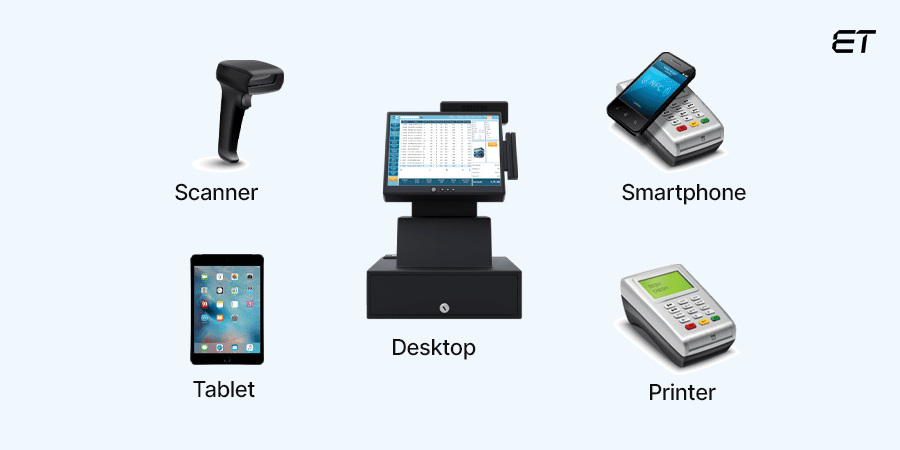
The technical build of a custom POS varies depending on your needs. So, what should you know? Here are the main points:
- Your system can work seamlessly with your existing hardware (scanners, receipt printers, etc.) or integrate with new equipment
- Developers can create the POS software based on your requirements, ensuring it aligns with your business processes and workflows
Overall, custom POS systems have robust security measures to protect sensitive customer data and financial information.

Already have a team but lacking some skilled resources? Then IT staff augmentation can work for you.
It Supports Multi-channel Deployment
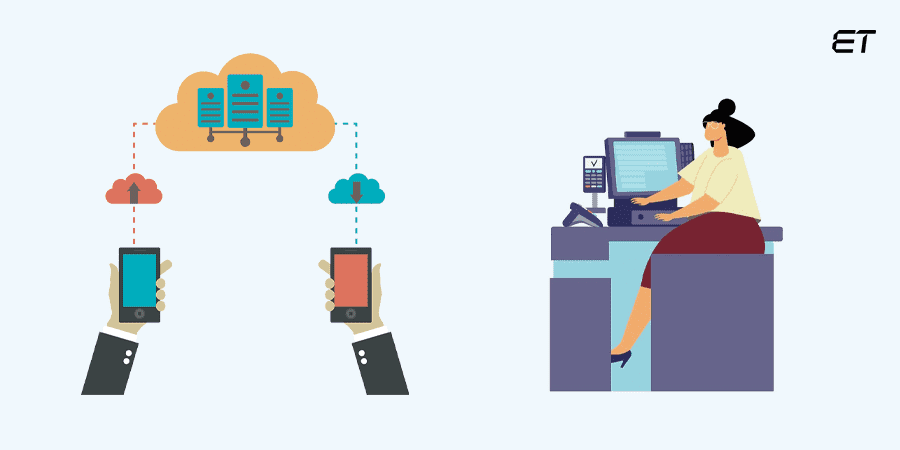
One significant advantage of investing in a custom POS system is flexibility. With the right development team, you can deploy it on two vital channels, allowing you to choose the deployment method that’s apt for your business needs.
The following table will offer a quick explanation of the same.
| Type of Deployment | Explanation |
| On-premise | The POS software is installed on your local hardware, providing full control but requiring maintenance and IT support on your end |
| Cloud-based | You can host the system on a remote server for greater flexibility and accessibility from anywhere with an internet connection |
A custom POS system is a valuable tool to meet your business needs. By understanding its core functions, customization potential, and technical considerations, you can make the perfect decision about its execution.
Main Components of POS Systems
Even if you decide to build a custom POS system, the basics remain the same. Developers will utilize an appropriate blend of hardware and software to create your tailor-made solution.
So, as a decision-maker, you should be aware of these components.
1. Hardware
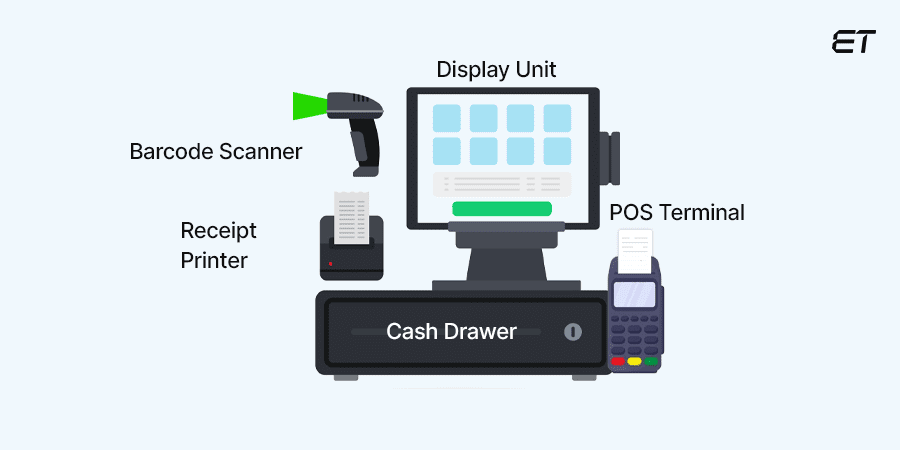
In simple words, hardware is the physical component you can see and touch. A basic POS system can have:
- POS Terminal
- Cash Drawer
- Receipt Printer
- Barcode Scanner
- Customer Display
- Credit Card Reader
In addition, you can demand other peripherals like a keyboard, mouse, or weight scale.
2. Software
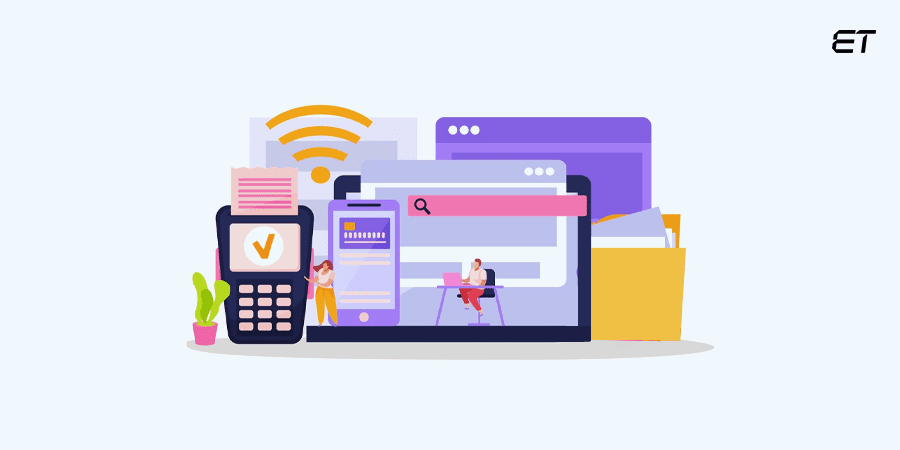
This component is the invisible force that powers the custom POS system. The software handles all the essential functions as follows:
- Sales Processing
- Inventory Management
- Customer Management
- Reporting & Analytics
Due to the customization aspect, you can also inform your development team to build features for employee management, gift cards, loyalty program management, and more.
The specific hardware and software components will vary depending on the type of POS system (cloud-based, mobile, etc.) and your business’s needs.
Features to Look for in a Custom POS System
When considering a custom POS system, there are core features to prioritize alongside the exciting customization possibilities.
Here’s a quick breakdown of such essential features:
|
Ideal Features of a Custom POS System |
|
| Name of the Feature | Functionalities |
| Sales Processing | Flawless processing of transactions, including adding items, handling taxes and discounts, and accepting various payment methods |
| Inventory Management | Real-time multi-location inventory updates, low-stock alerts and reorder suggestions, inventory structure handling |
| Customer Management | Store information like purchase history and customer preferences |
You can also request a software development company build a custom POS system with a new feature.
When making this decision, the following points should be on your agenda:
- Scalability: Choose a system that can expand or grow with your business. A custom POS system should be adaptable to accommodate future needs
- Ease of Use: The system should be user-friendly for both employees and, if applicable, customers using self-service kiosks
- Integrations: Ensure compatibility with existing software you use (accounting, marketing, etc.) or plan to integrate in the future
- Technical Support: Reliable ongoing support from the IT vendor is crucial for troubleshooting and maintaining your POS system
Overall, by prioritizing these core features alongside the customization potential, you can ensure you get a powerful tool that drives efficiency, enhances the customer experience, and gives you a significant edge in your domain.

Want to build a custom POS system for your business? Send your requirements and we’ll get back to you. Click here now!
How to Develop a Point-of-Sale (POS) System Step-by-Step
So, you’ve decided to build your own custom POS system. But how do you go from idea to a fully functioning, business-boosting platform?
Let’s walk through the key stages of POS system development.
1. Define Your Business Needs
Every POS system starts with one simple question: “What do you actually need it to do?”
This step involves identifying:
- Core functions like sales processing, inventory tracking, and payment handling
- Industry-specific features e.g., table management for restaurants or service scheduling for salons
- User roles and permissions (who uses the system and how)
Getting this right sets the tone for everything that follows.
2. Choose the Right Tech Stack
The technology behind your POS needs to match your business goals and scalability needs.
Your development team will choose:
- Frontend: Usually built with frameworks like React, Angular, or Vue.js
- Backend: Options include Node.js, .NET, Django, or Laravel
- Database: MySQL, PostgreSQL, MongoDB, etc.
- Hosting: On-premise, cloud-based (AWS, Azure), or hybrid
- Mobile Support: If required, mobile apps can be built using Flutter or React Native
Tip: Make sure the stack supports future upgrades and integrations.
3. Design the User Interface (UI/UX)
The UI should be simple, intuitive, and aligned with how your team operates.
This includes:
- A clean layout for quicker transaction processing
- Touch-optimized controls for kiosks or tablets
- Clear navigation for both admin and cashier roles
Remember: a sleek UI directly impacts speed and productivity.
4. Develop Core Modules
Here’s where your POS system takes shape. Key modules include:
- Sales Module: Transaction processing, discounts, tax calculations, and multiple payment options
- Inventory Module: Stock tracking, reorder alerts, and vendor management
- Customer Management: Profile creation, purchase history, and loyalty program integration
- Analytics & Reporting: Sales trends, staff performance, and peak business hours
- Security & Compliance: Role-based access, encrypted data storage, and PCI-DSS compliance
Each module is built and tested for seamless performance.
5. Integrate Hardware and Third-Party Tools
Your custom POS needs to work in harmony with your physical setup and existing systems.
This step involves:
- Connecting printers, barcode scanners, card readers, and other peripherals
- Integrating with third-party software like QuickBooks, CRM tools, or eCommerce platforms
- Ensuring smooth data flow between systems
6. Test Rigorously
Before going live, your POS must undergo:
- Functional Testing: Ensuring each module works as expected
- Usability Testing: Making sure the UI is intuitive for all users
- Security Testing: Checking for vulnerabilities and compliance gaps
- Load Testing: Verifying performance under real-world usage
Better to squash bugs now than deal with angry customers later.
7. Deploy and Train
Once everything checks out, it’s go-time.
- Deploy the system based on your chosen environment (cloud, on-premise, or hybrid)
- Train your staff with proper documentation, live demos, or guided onboarding
Smooth training = smooth operations.
8. Maintain and Scale
A POS system isn’t ‘set it and forget it.’ Your development partner should offer:
- Ongoing support and bug fixes
- Performance monitoring
- Feature updates based on feedback
- Scalability planning as your business grows
Building a custom POS system might seem like a big leap, but with the right development process, it can be a game-changing investment.
Popular POS Systems in the Market
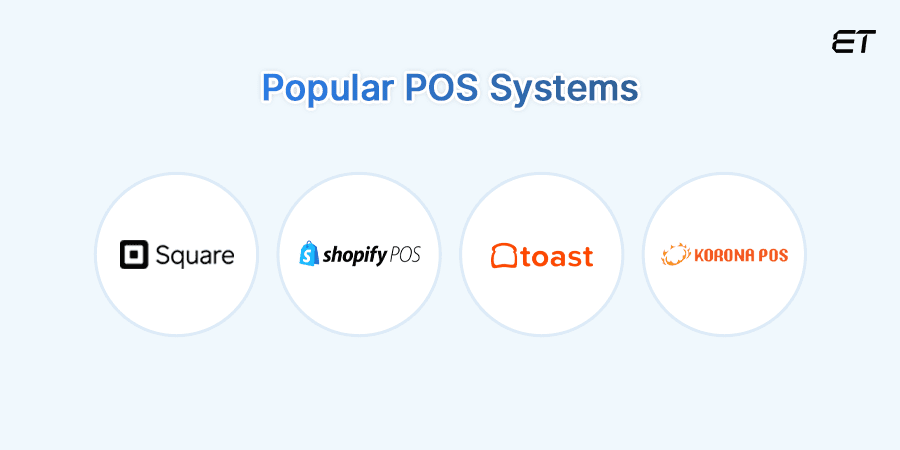
Custom POS systems offer a robust solution. However, you must choose a reliable vendor and pay for the development cost.
So, if you aren’t comfortable in this area, there are off-the-shelf options to explore. In this section, you can find some of the famous names.
| Name | Utility |
| Square POS | It is well-suited for small businesses and startups. Square POS has a user-friendly interface, a free basic plan, and a wide range of hardware options. However, some users report limitations on features and customization options |
| Shopify POS | This choice is ideal for businesses with an existing Shopify online store. It offers seamless integration between online and in-person sales, along with inventory management and customer profiles. Still, it may not be the most cost-effective option for businesses without an online presence |
| Clover POS | This is a versatile system focusing on hardware options and customization. It’s suitable for a variety of business types, from retail to restaurants. However, the pricing can be complex and may vary depending on chosen hardware and features |
| Toast POS | This name is a popular choice for restaurants, offering features specifically designed for the industry, such as table management, kitchen display systems, and menu management tools. It can be pricier than some general-purpose POS systems |
| KORONA POS | If you want a feature-rich POS system suitable for various retail businesses, this option is worth exploring. It offers strong inventory management, reporting, and customer management tools. However, pricing may be a consideration for smaller businesses |
Understandably, such options offer less personalization compared to a custom system. However, they can meet the requirements of some businesses lacking budget or resources.
We still believe that you can develop a custom system as part of a long-term business development plan. In the next section, we’ll quickly explain why choosing custom development can prove profitable.
Why Can Developing Custom POS Be More Lucrative?
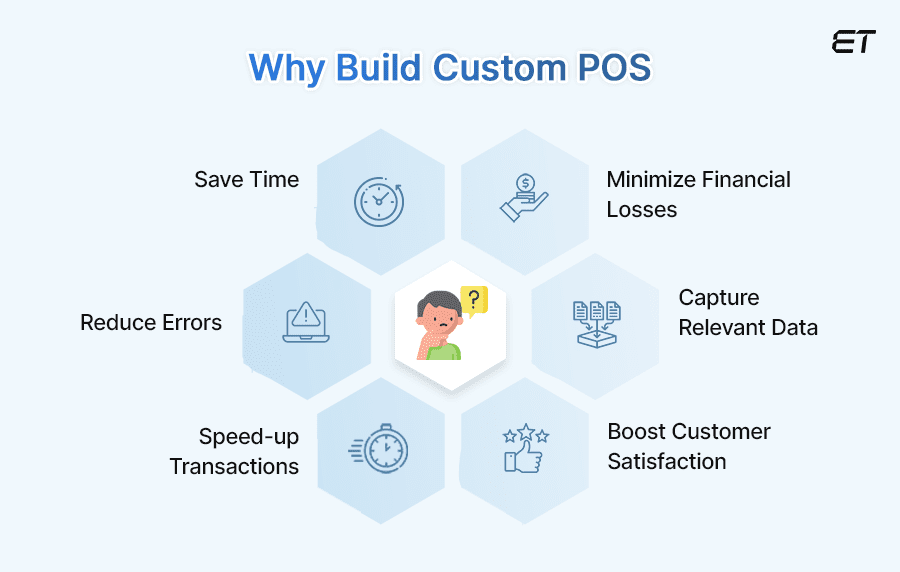
Without any ado, consider the following points that justify the decision to develop a custom POS system:
- Custom POS eliminates adapting your business processes to a generic system. It can match your workflows, saving time and reducing errors. So, you experience faster transactions, happier customers, and potentially lower labor costs
- Generic POS systems might offer basic customer management features, but a custom system allows you to integrate loyalty programs, targeted promotions, or self-service kiosks. This aspect can lead to increased customer satisfaction, repeat business, and higher average order values
- Off-the-shelf platforms provide essential data, but a custom system can capture and analyze highly relevant information for your business. Such data empowers you to make informed decisions for better inventory management, marketing strategies, and staff scheduling
- Custom POS systems can have robust security features for your needs and data. This facet minimizes the risk of data breaches and financial losses
While the upfront cost of developing a custom system might seem higher, it can be a wise long-term investment. The cost savings from improved efficiency, reduced errors, and data-driven decision-making can outweigh the initial investment.
Additionally, you avoid the potential limitations and recurring fees associated with off-the-shelf solutions that may not align with your evolving needs.
Custom POS Integrations
A custom POS system is a central command hub. And to reach its full potential, it needs to talk to your other systems.
That’s where integrations come in. By connecting your POS with other tools, you can automate workflows, reduce errors, and get a 360-degree view of your business.
Here are the most common (and powerful) POS integrations worth considering:
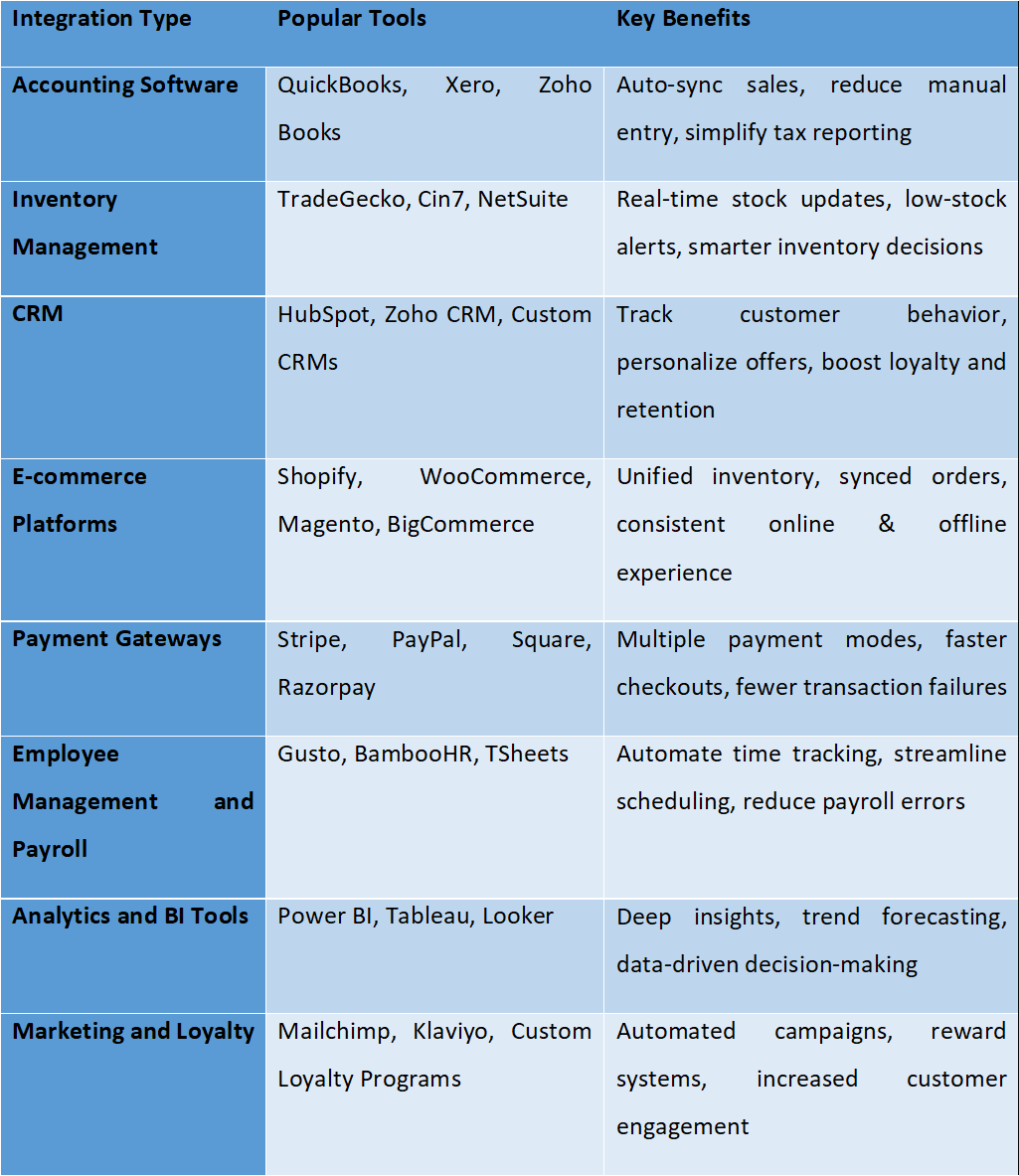
Build Your Custom POS System Today!
Today, the business landscape has become competitive. You need to maintain efficiency and customer satisfaction through all possible means. A custom POS system isn’t just a point-of-sale solution — it’s a strategic investment designed to streamline your operations, target the right customers, and empower data-driven decision-making.
While off-the-shelf POS systems offer a starting point, they lack the customization and scalability to propel your business forward. So, choosing a custom system signifies a commitment to growth and long-term thinking.
This decision can help you transform operations and give you a significant edge over competitors. So, are you ready to enhance your business’s POS area? Contact us today to discuss how a custom POS system can become your auxiliary asset.
Frequently Asked Questions
1. Isn’t a pre-built POS system cheaper than a custom one?
While upfront costs for custom POS development can be higher, you should consider long-term savings. Custom systems improve efficiency, reduce errors, and provide valuable data for better decision-making, potentially outweighing the initial investment.
2. Our business is constantly evolving. Can a custom POS system adapt?
Absolutely! A well-designed custom POS system is scalable. As your business grows, skilled developers can add new features and integrations to accommodate your changing requirements.
3. We don’t have an in-house tech team. How do we develop a custom POS system?
Many businesses partner with qualified development firms that specialize in building custom POS systems. Such organizations can guide you through the process and ensure the system meets your needs.
4. Security is a significant concern. Will a custom POS be more secure?
Custom POS systems can possess robust security features tailored to your specific data and operations. This facet can minimize the risk of breaches compared to generic systems with a broader range of users.
5. How long does it take to develop a custom POS system?
The development timeline depends on the complexity of your needs and desired features. Discussing your requirements with an experienced development partner will help determine a realistic timeframe for your custom POS system.
6. How much does it cost to build a custom POS system?
The cost typically ranges from $10,000 to $100,000+ depending on complexity, features, and integrations required.
7. What programming language is used for POS?
POS systems are commonly built using languages like JavaScript (Node.js, React), Python, Java, or C# based on platform needs and tech stack preferences.
8. What is the best POS system for a small business?
Square POS is often considered the best for small businesses due to its affordability, ease of use, and versatile feature set.



